|
|
|
Sort Order |
|
|
|
Items / Page
|
|
|
|
|
|
|
| Srl | Item |
| 1 |
ID:
109576
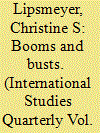

|
|
|
|
|
| Publication |
2011.
|
| Summary/Abstract |
A crowded field of research has focused on the relationship between government ideology and welfare policy. In advancing this work, I refocus the debate on how the economic context can affect the manner in which governments shape welfare spending. In my analyses of social expenditures during times of economic booms and busts, I find that governments in recessions relax their ideological visions, while those in periods of prosperity have the room to make discretionary policy changes. By combining theories of government behavior with assumptions about preferences during diverse economic climates, these findings show how the economic environment affects governments' abilities to implement ideological policies. More importantly, this transcends the extant literature, resulting in a more complete picture of the relationship between politics and welfare policies.
|
|
|
|
|
|
|
|
|
|
|
|
|
|
|
|
| 2 |
ID:
131145
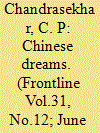

|
|
|
|
|
| Publication |
2014.
|
| Summary/Abstract |
Becoming another China is not easy as that will involve the reduction of expenditure on food subsidies and other welfare measures.
|
|
|
|
|
|
|
|
|
|
|
|
|
|
|
|
| 3 |
ID:
102562


|
|
|
|
|
| Publication |
2011.
|
| Summary/Abstract |
Public attitudes towards welfare policy are often explained by political values and perceptions of deservingness of welfare recipients. This article addresses how the impact of values and perceptions varies depending on the contextual information that citizens have available when forming welfare opinions. It is argued that whenever citizens face deservingness-relevant cues in public debate or the media, a psychological 'deservingness heuristic' is triggered prompting individuals spontaneously to think about welfare policy in terms of who deserves help. This is an automatic process, equally influential among the least and the most politically sophisticated. Moreover, when clear deservingness cues are present, the impact of values on opinions vanishes. These arguments are supported by data from two novel experimental studies embedded in separate nationwide opinion surveys. The findings revise conventional wisdom of how values and heuristics influence public opinion and have major implications for understanding dynamics in aggregate welfare opinion and attempts from political elites to manipulate public opinion.
|
|
|
|
|
|
|
|
|
|
|
|
|
|
|
|
| 4 |
ID:
094569
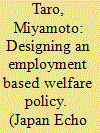

|
|
|
| 5 |
ID:
132611
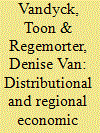

|
|
|
|
|
| Publication |
2014.
|
| Summary/Abstract |
We analyse the macroeconomic and distributional effects of increased oil excises in Belgium by combining a regional Computable General Equilibrium (CGE) model with a microsimulation framework that exploits the rich detail of household-level data. The link between the CGE model and the microlevel is top-down, feeding changes in commodity prices, factor returns and employment by sector into a microsimulation model. The results suggest that policymakers face an equity-efficiency trade-off driven by the choice of revenue recycling options. When the additional revenue is used to raise welfare transfers to households, the reform is beneficial for lower income groups, but output levels decrease in all regions. However, when the energy tax revenue is used to lower distortionary labour taxes, the tax shift is slightly regressive. In this case, national GDP is hardly affected but regional production levels diverge. The impact of the environmental tax reform on income distribution depends strongly on changes in factor prices and welfare payments, whereas sector composition is an important determinant for regional impact variation.
|
|
|
|
|
|
|
|
|
|
|
|
|
|
|
|
| 6 |
ID:
121091
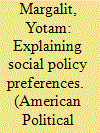

|
|
|
|
|
| Publication |
2013.
|
| Summary/Abstract |
To what extent do personal circumstances, as compared to ideological dispositions, drive voters' preferences on welfare policy? Addressing this question is difficult because a person's ideological position can be an outcome of material interest rather than an independent source of preferences. The article deals with this empirical challenge using an original panel study carried out over four years, tracking the labor market experiences and the political attitudes of a national sample of Americans before and after the eruption of the financial crisis. The analysis shows that the personal experience of economic hardship, particularly the loss of a job, had a major effect on increasing support for welfare spending. This effect was appreciably larger among Republicans than among Democrats, a result that was not simply due to a "ceiling effect." However the large attitudinal shift was short lived, dissipating as individuals' employment situations improved. The results indicate that the personal experience of an economic shock has a sizable, yet overall transient effect on voters' social policy preferences.
|
|
|
|
|
|
|
|
|
|
|
|
|
|
|
|
| 7 |
ID:
158145
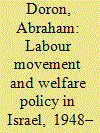

|
|
|
|
|
| Summary/Abstract |
This article reviews the attitudes of the Israeli labour movement, particularly the position of Mapai, the dominant party in that movement, regarding the development of welfare policy in Israel from the establishment of the state in May 1948 until May 1977, when Labour lost power to the Likud party. The review and discussion focuses on the development of social security ‒ the national insurance system, the welfare services ‒ the provision of assistance to people in need, as well as the personal care services, which are primarily provided by social work professionals.
|
|
|
|
|
|
|
|
|
|
|
|
|
|
|
|
| 8 |
ID:
125961


|
|
|
|
|
| Publication |
2013.
|
| Summary/Abstract |
The recent calamity in Uttarakhand has left the entire country in a state of shock. The only organisation that stood the test of time was the Indian armed force, which turned saviours for the thousands stranded in the ravaged mountain terrain. Every time a calamity - natural or man-made - strikes, the men in uniform are remembered and every time, they respond with alacrity and diligence. Yet, the government which turns to them in times of crisis, doesn't really care much about their welfare. The authorities have relentlessly stonewalled any steps to improve the standard of life of armed forces personnel (Junior Commissioned Officers and other ranks) whether it concerns pension, payment of arrears or insurance benefits. Even other welfare measures have been denied by political parties who have vested interests. That's all the more reason to ask whether the soldier is effectively covered by the insurance policies extended by the Army Group Insurance Fund (AGIF)?
|
|
|
|
|
|
|
|
|
|
|
|
|
|
|
|
| 9 |
ID:
135073
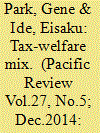

|
|
|
|
|
| Summary/Abstract |
Despite having the highest level of public debt in the Organisation for Economic Co-operation and Development (OECD), higher than Greece or Italy, Japan has one of the lowest aggregate tax burdens of the advanced industrial democracies. This paper asks why Japan, once described as a strong developmental state, has had such a weak extractive capacity, an inability to raise revenues to confront deficits and public debt? In contrast to the existing explanations that focus on political institutions, partisan preferences, or economic globalization, this article argues that Japan's ‘tax–welfare mix’ – the combination of taxes and redistributive welfare polices – undermined the state's long-term capacity to secure adequate tax revenue. More than just a source of revenue, taxes can be used directly to achieve redistributive goals, such as targeting low taxes and exemptions to specific groups. This study shows how Japan's tax–welfare mix diminished its extractive capacity through three mechanisms: the political lock-in of a redistributive social bargain struck around low taxes, the timing and sequencing of its tax policy and welfare development, and the erosion of public trust, which undermined tax consent. Beyond offering a new theory of extractive capacity, the tax–welfare mix explains aspects of Japan's tax structure that defy existing explanations and contributes to our understanding of the capitalist development state by highlighting the redistributive political function of tax policy and its long-term impact on state capacity.
|
|
|
|
|
|
|
|
|
|
|
|
|
|
|
|
| 10 |
ID:
187049
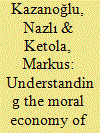

|
|
|
|
|
| Summary/Abstract |
The implementation of neoliberal welfare frameworks since the ascendancy of the Justice and Development Party in 2002 has led to a fundamental reorientation of the state-civil society relationship, where non-governmental organizations (NGOs) have been given wide-reaching roles in the delivery of welfare. In the field of family policy, the NGOs benefitting from such policies are largely faith-based organizations with close relationships with the AKP government. Based on interviews with Turkish women’s NGOs (WNGOs), this article studies the intersections of gender, family, civil society, and the state to shed light on the development of contemporary welfare policy in Turkey.
|
|
|
|
|
|
|
|
|
|
|
|
|
|
|
|
|
|
|
|
|